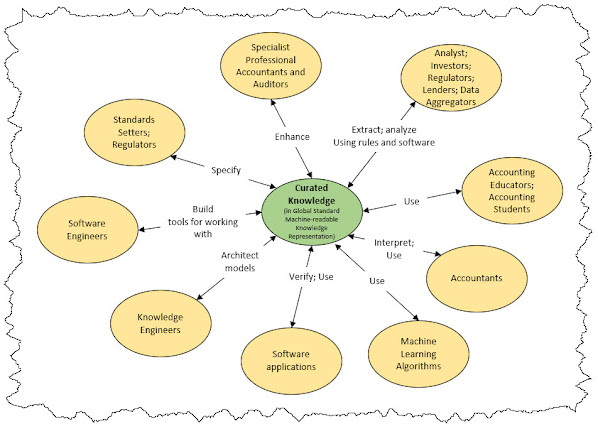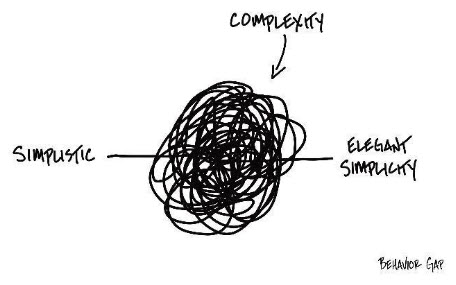An area of knowledge (a.k.a. area of interest, community of practice, collective, field, domain, subject domain, universe of discourse, society) is a highly organized socially constructed aggregation of shared knowledge (a.k.a. corpus) for a distinct subject matter. Subject matter experts (SMEs) create, use, and maintain an area of knowledge.
Every subject matter expert can off the top of their head state a few rules from their field. Astounding performance enhancements can often be achieve by combining only a few rules.
Intersubjectivity refers to the shared cognitive understanding and mutual knowledge that the members of an area of knowledge have when they communicate information and interact with each other. Epistemic risk relates to the risk that shared cognitive understanding and mutual knowledge being wrong. Conceptual failure is where there is a breakdown in that shared understanding and mutual knowledge. Governance relates to the management of epistemic risk.
An area of knowledge has a specialized insider vocabulary, underlying assumptions (axioms, theorems, constraints, assertions, restrictions), and persistent open questions that have not necessarily been resolved (i.e. flexibility is necessary). You can think about an area of knowledge as being characterized in a spectrum with two extremes:
- Kind area of knowledge: clear rules, lots of patterns, lots of rules, repetitive patterns, and unchanging tasks.
- Wicked area of knowledge: obscure data, few or no rules, constant change, and abstract ideas.
Stakeholders of a system need to be in agreement as to an undisputed core knowledge of an area of knowledge. Sensemaking is the process of determining the knowledge, or deeper meaning or significance or essence, of the collective experience for those within an area of knowledge.
The Cynefin Framework provides a tool for understanding and categorizing knowledge and rules within a corpus. Per the Cynefin Framework, knowledge can be categorized as being:
- Best practice (clear and obvious, repeatable, easy to create a simple recipe for best practice)
- Good practice (may only be immediately obvious if you have the right skills and experience like subject matter experts; if you have the right skills and experience, then it is still easy to create a simple recipe for a good practice that can be applied)
- Emergent practice (tend to need to have more skills and experience, then can use principles to group alternatives into sets of good practices; could be many recipes but recipes can still be created; solutions tend to be understood in retrospect and through experimentation and iteration)
- Novel practice (tends to be unique, but describable, only the "best of the best" work at this level within an area of knowledge; might be a lot of recipes but recipes can still be created; usually there are simple rules that explain the situation but they are not obvious and have to be discovered usually requiring an advanced understanding of the area of knowledge)

Note that an area of knowledge does not exist within a silo. One area of knowledge can interact with some other area of knowledge.
Other aliases use for the term area of knowledge are "domain of understanding" or "domain" or "system of interest" or "community of practice" or "body of knowledge" or "corpus" or "domain under investigation".
Governance is the framework for setting of boundaries of acceptable conduct and practices of stakeholders of the area of knowledge and controls their decision-making processes through the creation and enforcement of guidelines for an area of knowledge.
Subject matter experts (SMEs) must clearly understand their area of knowledge and explicitly state their assumptions about a particular area of knowledge. This clarity ensures effective communication among SMEs regarding that area of knowledge.
Knowledge representation using some
knowledge representation approach serves as a deliberate, explicit, and formal representation of this understanding in machine-readable form. Such a representation facilitates communication within an area of knowledge and across different areas of knowledge.
This knowledge representation for an area of knowledge intentionally describes stakeholders' explicit assumptions about the important, relevant nature and structure of the area of knowledge, along with a vocabulary that stakeholders within an area of knowledge can use to discuss this
knowledge. The vocabulary and relevant nature and structure constitute a commitment to the area of knowledge, known as ontological commitment. The goal is to minimize ambiguity and misunderstandings among stakeholders within an area of knowledge. Falsely believing that you agree when you actually do not agree also needs to be avoided.
There is no trustworthiness without an explanation.
Another important goal is to enable stakeholders to effectively expand or extend the vocabulary, nature, and structure of the area of knowledge when necessary. These expansions should be plausible and consistent with the existing knowledge representation, building on that base. They should conform to expectations. They should be coherent.
A knowledge representation does not describe what exists in "reality"; instead, it articulates one perception of reality based on the explicit assumptions of the knowledge representation. The knowledge representation acts like a pair of glasses, making a specific view of an area of knowledge explicit. Other knowledge representations could have different explicit assumptions.
With good knowledge representations, common agreement can be achieved by stakeholders. But in addition, reasons for disagreement can be understood and discussed effectively.
A well-founded knowledge representation can make explicit the reasons for agreement and the reasons for disagreement therefore make obstacles to mutual understanding clear. Mutual understanding leads to interoperability. A well-founded knowledge representation makes intended meaning explicit.

Tremendous benefits in the form of reduced friction can be realized with knowledge related to an area of knowledge is represented in machine readable form. Automation can streamline many of the mundane tasks performed by stakeholders. Smart software can leverage this machine-readable knowledge and will amplify, augment, and empower these subject matter experts rather than replace them.
When stakeholders (subject matter experts) within an area of knowledge impose their specific points of view on other stakeholders, the opportunity of and therefore the benefits of collaboration can be lost. Absurdity arises when stakeholders, trapped in their own subjective truths, fail to understand or recognize or respect the perspectives of other stakeholders. This leads to power struggles that hinder effective collaboration within and across an area of knowledge, as these different points of view clash without ever converging on a shared understanding. An area of knowledge can, and should, support different points of view, see these different points of view with clarity, and be able to discuss these different points of view openly. Embracing this enables novel practice to become emergent practice; emergent practice to become good practice. and good practice to become best practice.
Additional Information:





Comments
Post a Comment